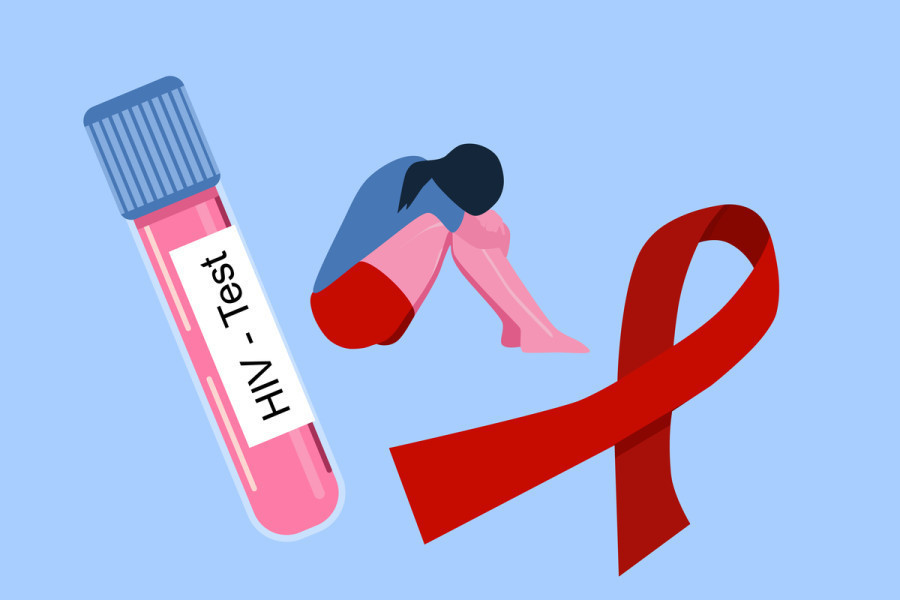Health
Nepal HIV prevention efforts grind to halt after USAID pullback
Pre-exposure medications and outreach efforts for sex workers, drug users, and vulnerable groups have been stalled.
Arjun Poudel
Hundreds of female sex workers and gay men, and people taking injectable drugs in Nepal have been deprived of pre-exposure prophylaxis since the USAID-funded programmes were suspended in the last week of January.
Pre-exposure prophylaxis is a medicine that people at risk for HIV take to prevent infection from unprotected sex or injectable drug use.
“With the US government suspending nearly all foreign assistance worldwide for three months in the last week of January, the administration of pre-exposure prophylaxis medicine has been halted indefinitely,” said Lok Raj Pandey, information officer at the National Center for AIDS and STD Control.
“Since the Health Ministry does not have its own preventive programmes, hundreds of at-risk people, including pregnant women whose husbands are HIV positive, have been deprived of medicine. This medicine is given to such women to prevent transmission of infection from infected husbands.”
The halt in the administration of pre-exposure prophylaxis medicine is one of several HIV-related initiatives, which have been affected by the abrupt suspension of USAID-funded programmes. Awareness campaigns targeting female sex workers, homosexual men, and other high-risk groups, community testing of HIV, behavioural change and other targeted interventions have also been halted indefinitely.
Pandey informed that over 1,500 at-risk people from 26 high-risk districts were receiving medication through the USAID’s programme.
The affected districts include Jhapa, Morang, Sunsari, Saptari, Mahottari, Siraha, Dhanusha, Sarlahi, Bara, Rautahat, Parsa, Makawanpur, Chitwan, Kathmandu, Lalitpur, Bhaktapur, Kaski, Nawalparasi-East, Nawalparasi-West, Lumbini, Kapilvastu, Dang, Bardiya, Banke, Kailali, and Kanchanpur.
Health officials say that the government has allocated funds only for free testing and treatment of those already infected, and the responsibility of launching preventive measures, including awareness campaigns, was entrusted to USAID. They also said that the chances of allocating a budget for preventive programmes in the next fiscal year are also almost nil, as the budget ceiling for the upcoming fiscal year is too low to continue even basic services, including antiretroviral treatment and HIV testing programmes.
The budget ceiling for the next fiscal year has been reduced by Rs55 million compared to the current fiscal year.
The centre provides antiretroviral medicines to over 25,000 people living with HIV, along with services like prevention of mother-to-child transmission, CD4 count and viral load tests, and HIV testing during pregnancy, among others, all free of cost.
By 2023, an estimated 30,300 people were living with HIV in Nepal. It is estimated that 261 people died of AIDS that year.
Along with programmes related to HIV prevention, several healthcare programmes for the ongoing fiscal year, including all funded by the USAID have been suspended.
Among the terminated programmes are key health surveys, including the micronutrient survey, which was planned over the past 10 years, the lymphatic filariasis transmission survey, and the promotion of exclusive breastfeeding at 18 major hospitals.
Other affected programmes include ‘outbreak investigation training’ for doctors, neonatal care training for hundreds of doctors and nurses, and various programmes related to the Sustainable Development Goals, including maternal and child health, nutrition, reproductive health, and family planning. Programmes under the Integrated Health Information Management System have also been hit.
Meanwhile, officials at the Center informed that the officials at the Ministry of Health and Population have assured to increase the budget ceiling, and the United Nations agency has committed to invest in HIV preventive programmes.
“UNDP has committed to invest in some preventive measures, including an awareness programme targeting migrant workers, prisoners, and people who inject drugs, but their programme has not started yet,” said Pandey. “We hope that the UN agency programme will begin soon.”




 14.12°C Kathmandu
14.12°C Kathmandu















